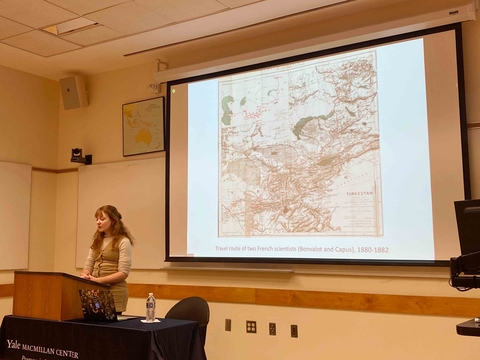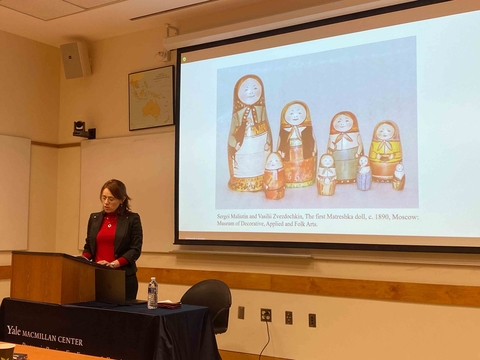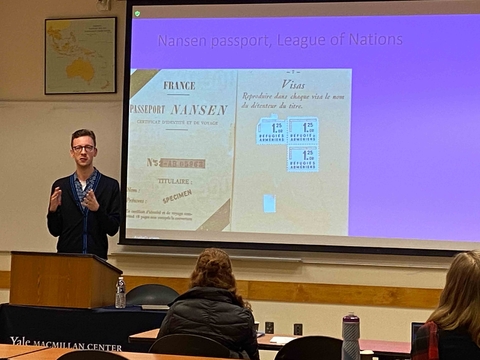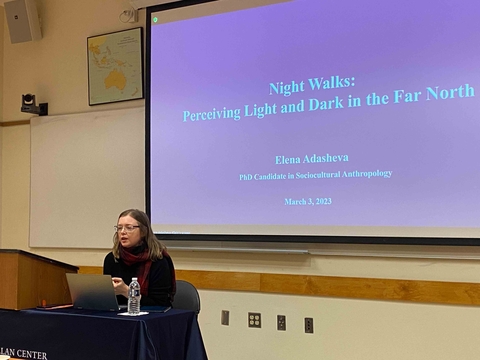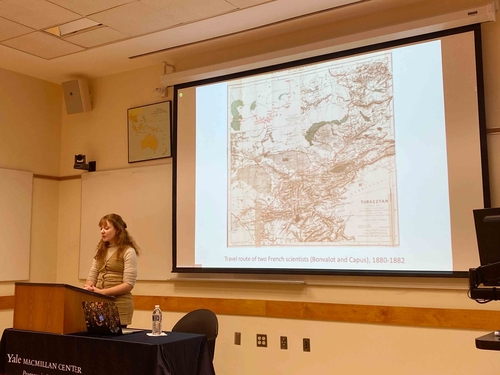
On March 3, 2023, the Program in Russian, East European, and Eurasian Studies (REEES) of the Yale MacMillan Center hosted a Symposium on Yale PhD Research in REEES, generously sponsored by the Carnegie Corporation.
Molly Brunson, Associate Professor in Slavic Languages and Literatures and History of Art, who serves as Faculty Director of REEES, started off the symposium by talking about the history of Russian Studies at Yale. Since the founding of the program in 2018 and with the financial support of the Carnegie Corporation, REEES has been instrumental in supporting pre-dissertation and dissertation research related to Russian studies with 31 awards granted in 5 years. The graduate recipients of these awards came from a wide range of disciplines in the humanities and social sciences. They conducted research throughout the region, even pivoting to Russia-related archives and locations outside of Russia when the pandemic and war made travel difficult. The symposium, then, was an occasion to mark the conclusion of the Carnegie grant and the fulfilment of its main goal: to invest in Russian studies across the various disciplines at Yale and support a new generation of area studies scholars.
The Symposium featured doctoral research in a variety of REEES disciplines, including Slavic Studies, History, Comparative Literature, and Sociocultural Anthropology.
Hana Stankova, PhD Candidate in Slavic Languages and Literatures, presented a dissertation chapter titled, “‘Benefiting the Scientific World Above All: Russian and French Scientific Explorations in Central Asia.” Hana interrogated the goals and implications of the Russian and Western European scientists’ journeys to Russian Turkestan by analyzing several travelogues they produced. These travelogues were, apart from exhibitions, the most public-facing aspect of their work and, as such, offered insight into how these scientific journeys were presented to the public and how they affected public perceptions of Russian Turkestan. Hana was also interested in how these representations changed across time and national contexts, from the early Russian to the later Western European journeys to Turkestan.
Liliya Dashevski, PhD Candidate in Slavic Languages and Literatures, discussed a dissertation chapter titled, “Toying with Peasants: Maria Mamontova’s Children’s Education Shop.” Liliya spoke about one of Russia’s most popular symbols, the Matreshka nesting doll. Liliya situated Matreshka in the context of the 19th century peasant-inspired toys, and more specifically, in connection with Maria Mamontova’s shop “Children’s Education.” Liliya’s analysis of the shop’s catalogs, published in 1896, examined what toys were offered by this shop and how they represented the peasantry. The larger question Liliya asked was about the kind of Russian child the “Children’s Education” shop promised to raise.
Orel Beilinson, PhD Candidate in History, offered a paper that was not part of the dissertation titled, “Youth as Emigres in 1917: Building Personal Futures Awaiting Collective Restoration.” Between 1917 and 1920, one to two million people fled the Bolshevik state that emerged from the Russian Empire’s ashes. Orel’s study focused on the necessity of building a life as a young adult coming of age in another country. The presentation discussed first findings on the experience – both materialistic and mental – of constructing a personal future while the future of the nation was still in a flux.
Kayhan Nejad who received his PhD at the Department of History in 2021, currently is a Visiting Fellow at the Nizami Ganjavi Centre of the Faculty of Asian & Middle Eastern Studies at Oxford University. Kayhan presented a paper titled, “Provincial Revolution and Regional Anti-Colonialism: The Soviets in Iran, 1920-1921.” This research probed the Soviets’ attempts to construct a socialist republic in northern Iran in 1920-21. Based on the records of the Archive of Foreign Policy of the Russian Federation and the Russian State Archive of Social-Political History, the study asked if the Soviet occupation of northern Iran was intended as a provincial, national, or even international project. Moreover, Kayhan investigated how the Soviets’ ground-level relations with Iranian communists and other factions influenced their plans for revolution in “the East,” including in Iraq and India.
Alexander Strzelecki, PhD Candidate in Comparative Literature, introduced early-stage dissertation research in the talk titled, “Stateless cities from the Russian revolution until the Ukraine invasion.” Alexander investigated transnational literary migrations from the USSR/Russia to European cities in the early 20th and 21st centuries. This study examined the links between Eastern European literary production and French language and culture, drawing from literary lives of Nathalie Sarraute and Romain Gary among other writers. Alexander proposed a comparison between Paris in 1920-1930 and Warsaw in 2010-2020. With the rise of authoritarian regimes in Belarus and Russia, followed by the Maidan Revolution in Kiev, and now the Russian invasion of Ukraine, Poland saw a gradual influx of refugees and migrants from the East. The literary and cultural stage became reinvigorated by writers and directors taking up residence in Warsaw. A prime example was the career of Ivan Vyrypaev, dramatist and playwright who left Moscow, staging his Russian-language plays and classics in Polish theatres. Comparing Sarraute, Gary and holders of Nansen passports with writers currently escaping Russia’s neo-imperial war and propaganda revealed the longue durée of crises of literary identity wrought by political violence.
Elena Adasheva-Klein, PhD Candidate in Sociocultural Anthropology, presented preliminary results of dissertation fieldwork in the Russian Arctic in the talk titled, “Night Walks: Perceiving Light and Dark in the Far North.” Elena’s research project focused on human relations to urban and natural landscapes in the North, and the ways in which lighting conditions shaped these relations. This experimental ethnographic study offered a narrative of a walk in the northern landscape, featuring descriptive writing and photographs. Elena’s practice drew from multidisciplinary literatures on light and dark, phenomenology, and the anthropology of walking. Probing the (im)possibilities of ethnographic description, this work exemplified an exploratory approach to the human-environment relations in the Arctic. In addition to REEES funds, Elena’s dissertation fieldwork was jointly supported by the National Science Foundation and the American Councils for International Education.
This Symposium fulfilled an important intention of the Carnegie Corporation grant, encouraging graduate research and REEES community-building. The event had the added benefit of bringing graduate students together at a time when they were navigating the double crises of the pandemic and war in Ukraine, with the unprecedented negative impacts of both on their research and professional networks.


